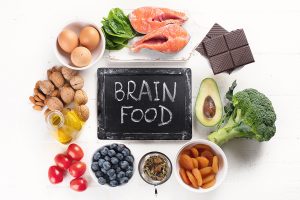 Like many friends our age, Rob and I have tried to eat for a better brain and to avoid many of the chronic diseases that attack seniors. Each year, we find ourselves making progress. Which is probably why we both maintain low BMI numbers and healthy waist to hip ratios at ages 75 and 79. (Need a refresher course on BMI? Read here.)
Like many friends our age, Rob and I have tried to eat for a better brain and to avoid many of the chronic diseases that attack seniors. Each year, we find ourselves making progress. Which is probably why we both maintain low BMI numbers and healthy waist to hip ratios at ages 75 and 79. (Need a refresher course on BMI? Read here.)
But beyond weight, there are more crucial issues at play, like keeping our hearts ticking and brains healthy. It’s human nature to eat for pleasure, and to eat the maximum you can get away with! As I often say, the road gets narrower with each year.
Ideal Diet for Senior Brains?
This is where it gets confusing. Neither doctors nor nutritionists are on the same page when it comes to what to eat. After reading countless books and watching online videos from experts of all stripes (body builders, trainers, athletes, doctors and nutritionists) I’ve realized that there is an ideal diet for seniors, it’s just not coming from one single person or theory. But there are enough overlaps that suggest guiding principles on what to eat for a better brain.
My mission is to find and summarize the best strategies for anti-aging, longevity and senior health and communicate them to others. My knowledge in the domain of nutrition is expanding but still growing. That said, I will attempt to write a series of posts that provide suggestions for better senior nutrition, especially for brain health.
What’s good for the brain is good for the heart, the digestive system, and for whole body health. So let’s start with how to eat for better brain health. While losing weight might be your focus, if you improve your diet for your brain, you will also see improved BMI and health markers.
10 Steps to Change the Way You Eat and Drink
Here is a summary of tips to start eating for brain health:
- Pick the healthiest protein. Calculate how much protein per day you need. Use wild caught fish with low mercury (salmon, sardines, anchovies) and grass-fed meat. Limit milk and dairy.
- Get your fill of the healthiest fats (olive oils, coconut and avocado oils). Stop eating vegetable fats. Use grass-fed butter or ghee.
- Eat colorfully: greens, reds, yellows, blues and other hues. This means lettuce(s), bell peppers, tomatoes, eggplant, cabbage, Brussel sprouts, broccoli, cauliflower, spinach, celery, onions, garlic, and much more.
- Limit carbohydrates to veggies and some fruits (blueberries, strawberries), stop eating refined carbohydrates and junk food. Avoid most grains and “whole wheat,” corn, and processed pasta and rice.
- No sugar. Not even honey, no candy, ice cream or desserts. No artificial sweeteners except Stevia.
- No sodas, sugary drinks, fruit juices, limit caffeine, but drink green and other teas. Mostly drink water (which can be flavored with lemon or lime.) No alcohol, (unless you can limit it to 2-3 glasses of wine per week.)
- Use smart herbs and spices to flavor your food (curcumin, ginger, herbs de Provence, etc.)
- No fried foods.
- Eat organic. (What’s really expensive are medical bills, not food.)
- Don’t eat 2-3 hours before bed. Try to not eat anything for 12-16 hours between dinner and breakfast or lunch. Intermittent fasting allows time for metabolism, but also kicks in your body’s natural detox system called autophagy.
If you’re like me, it’s hard to follow any diet, even when you know it’s good for you. My nature is a bit rebellious, and I hate anybody telling me what I can’t eat. I also cave easily to instant gratification. The only way around this, for me, is to track what I eat and not beat up on myself.
Progress, not perfection. One step at a time. Right now, I’m focusing on eliminating sugar and snacking before bed. That’s hard for me. Fortunately, the internet is full of good recipes and suggestions that are healthy. Just like when I quit smoking and drinking, I’m applying some of the tried-but-true motivation hacks. I’m getting there.
It may not be this week, but I’m not going to bite off more than I can chew, pun intended. I remind myself that I’m a far cry from what it was 10, five and one year ago. My brain feels less foggy in the mornings and I have 70 percent less morning headaches, thanks to a greatly reduced carbohydrate consumption. That’s amazing.
No doctor could make any suggestion or prescribe medications that would cure those two symptoms. Good diet can and will let us all live healthier lives, avoid dementia, brain fog and headaches. I’m convinced. But every senior will have to figure out what kind of diet suits them best.

Recent Comments